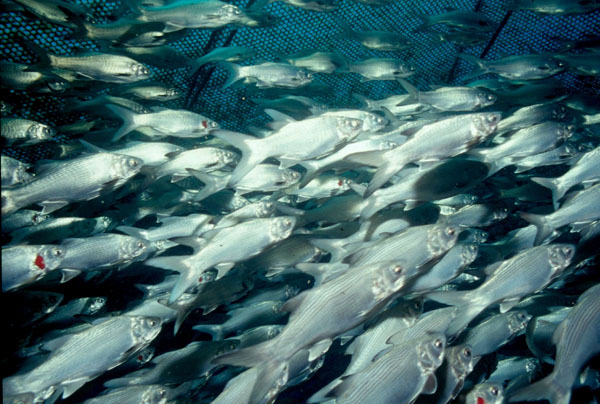The first monitored cases of Ictheffigius virus occurred in un-sustainable, farmed fish that were living in pens suspended off of the Citnalta Sea floor. The fish in these pens were fed endangered wild bait fish, massive doses of anti-viral drugs and grains that disrupted the natural flora of their guts – leading to the rapid spread of many drug-resistnant diseases among them. Lax regulation and enforcement did not ensure that the fish or their waste were properly disposed of when the virus was discovered.
The Ictheffigius virus evolved among a fish population resistant to human anti-virals that were pumped into their pens in a system with rapid product turnover to the un-examining human consumers. When humans ate infected farmed fish and contracted the newly evolved Homoeffigianimus virus, and when the penned fish spread the debilitating disease to their wild cousins, we had no effective anti-viral left to treat the illness, nor did the irresponsible system of fish farming have any means or resources to treat or suspend a plague of fish-born nature.
There are responsible aquaculturists and sustainable wild fish catchers, and it is important that consumers support these over the dangerous and wanton fishmongerers who still seek to feed humans unhealthy, harmful, cheap, fast food that cannot be traced back to a balanced system of supply. If you cannot afford to pay a responsible aquaculturist for the exact story of where the fish came from, it may be best to catch it yourself or subsist on whichever foods you can guarantee safe for you and your family. Do not fall into the old trap of not looking under the water at low-tide. At high tide you can’t see all of the writhing zombie that are hidden by the waves, but it doesn’t mean that they’re not waiting for you, and it often means that they were dragged there by irresponsible fisherpeople.
If you live inland, away from the largest oceans and bodies of water, you may be lucky. Many of the safest fisheries are located away from large bodies of water, where they keep their fish in healthy aquariums, do not dredge the bottom for deep-sea catches like endangered corals and otherwise undisturbed zombie remains. Those who are not near the sea cannot pollute the free water with heavy metals, are far from the worst toxins found in the free water and cannot transfer illnesses from their schools of fish to the wild herds.
If you live near a major body of water, be sure to select a fisherperson at the market who can tell you how many tons of fish they catch per year, and who does not brag about the high number. A fisherperson who catches too many fish is likely not to be picky about the health of the fish or how many habitats they destroy with their nets and pens. Humans may have lots of fish now, but over-killing them and wrecking their wild homes could lead us down another road to shortages and unsafe farming practices. Eat only what you need from fisherpeople who do not try to catch too many.
Whenever possible, visit the fishery or boat dock of your fish supplier. Observe the conditions of the vessels and note whether or not they are over-crowded, dirty or in ill repair. Ask for a tour, shake hands and pre-arrange your order if you like what you see. By buying safe fish, we can all prevent another serious plague and leave the remnants on the bottoms of the deep trenches where they belong.

